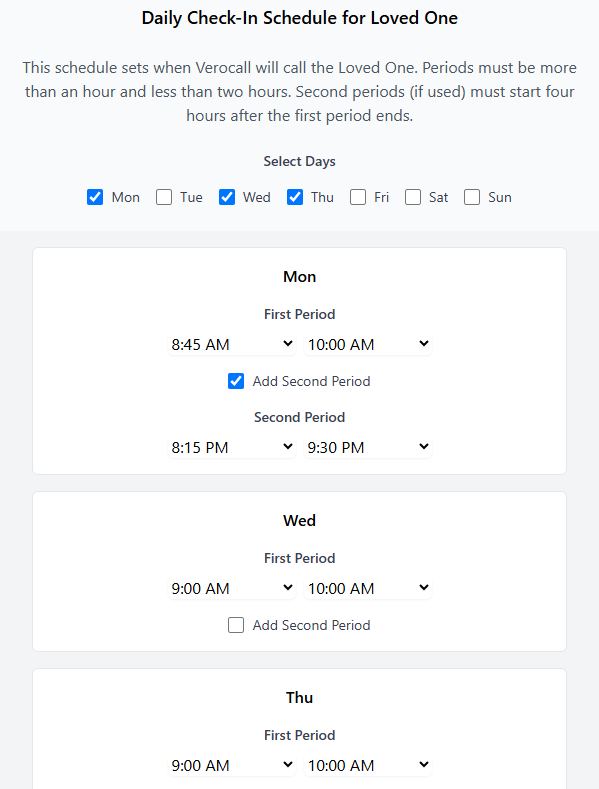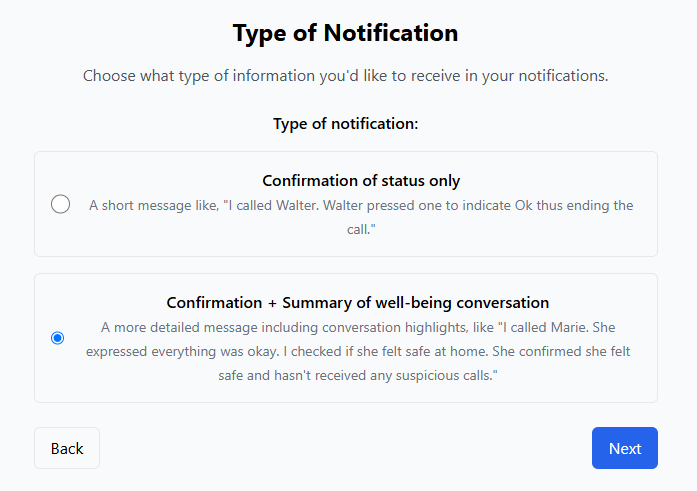Here is a step by step guide to the options you have for your Verocall Check In Service.
Most users enjoy check-in calls every day.
Verocall will call Loved Ones on a scheduled basis and your agent, e.g., AudryBot or MatthewBot, will discuss well-being topics or just about any other topic you ask about.
In the ideal call, the Loved One will answer questions and discuss well-being issues, but it’s OK to decline to answer questions that are not comfortable.
The Loved One can ask the agent any questions, lodge complaints, research, ask for details, or express preferences for future calls. Your agent has a long memory and encyclopedic knowledge. You’d be surprised how much your agent knows, although your agent can never and will never give medical advice.
The Loved One can end the call any time, or press “1” to indicate OK status. Your agent will politely end the call if frustration is detected, the conversation is dragging along, there’s over 15 seconds of silence, or it’s just not the right time to talk.
After the call, a short summary of the conversation can be sent to the Loved One’s designated contacts (we call this the Care Circle) if preferred. Your agent can look at past conversation summaries and can raise areas of concern based on statistical analysis, e.g., repeated concerns about breathing problems, or unaddressed safety issues in the living area. This is one of the advantages of Verocall over other binary check-in systems, in that it can prioritize important issues, increasing preventative awareness of the Loved One’s well being.
Alerts on no-engagement events
Verocall will attempt a specified number of calls during your preferred check in times. If no engagement can be confirmed via phone call, text, or email, a message indicating “no engagement” will be sent to the specified Care Circle contacts.

Usability Note: Background Noise
Background noise can confuse your agent. Using a speakerphone or conducting a call with loud background noise will cause unpredictable call experience.
Calling In
Loved Ones can call Verocall’s toll free number during valid check in times. If no engagement can be confirmed via phone call, text, or email, a message indicating “no engagement” will be sent to the specified Care Circle people.
Texting In
Loved Ones can text an “OK” message to Verocall to indicate “OK” status during check in times. If no engagement can be confirmed via phone call, text, or email, a message indicating “no engagement” will be sent to the specified Care Circle people.
Emailing In
Loved Ones can email an “OK” message to Verocall to indicate “OK” status during check in times. If no engagement can be confirmed via phone call, text, or email, a message indicating “no engagement” will be sent to the specified Care Circle people.
Well-Being Topics
Each Loved One is different. Some can run a half marathon at 75 years old, and some may be mobility challenged at 60. Some are mentally agile and some may struggle with memory. Verocall allows the Loved One, and/or one designated Care Circle person to set appropriate topics that will be given priority in discussions. Your agent will politely persist to raise these topics on each call, but will give priority to questions asked by the Loved One during discussions.

Your agent has exceptional ability to hold engaging discussions that create a comprehensive well-being profile with analysis of the Loved One’s improvements or declines over time. This analysis is not a medical diagnosis, but it can be used as a predictive indicator of priorities that need attention in the future. Verocall will not ‘warn’ of likely future issues, but it will list the most prominent concerns to enable future conversations to be applicable and actionable. The Loved One and the Care Circle can access this summary any time in a secure, private environment.
How many call attempts will Verocall make for each check-in period?
Most choose 3 attempts total (first call plus two more) because sometimes it’s hard to get to the phone (on another call, in the shower, etc). Attempts are about 20 minutes apart. You can set how many call attempts Verocall will make if there’s no answer from the Loved One within a check-in period.

Verocall will stop calling when:
- The Loved One’s well-being is confirmed (via call, text, or email)
- OR once the limit set here is reached
- or once the check-in period has ended
Who should be in the care circle?
A Care Circle is one or many designated contacts who want notification of a loved one’s status. Most often, these are adult children, neighbors or care providers.
A Care Circle person can create an account and invite a Loved One. Or A Loved One can create an account and invite up to four people to be in a Care Circle. The Primary Care Circle Person can modify or cancel the service for everyone.

Care Circle contacts can opt for call summaries or simple confirmation of status updates. Most Care Circle contacts prefer text messages. so they can respond quickly if the Loved One fails to check in or answer.

Privacy Note:
It’s important that the Loved One (the one receiving calls) knows that summaries of the each conversation can be shared with Care Circle contacts. It’s rare, but this could include misinterpretations, e.g., “Imelda mentioned she plans to fly to the moon,” and it’s up to the Care Circle contact to follow up and verify the Loved One’s status.
